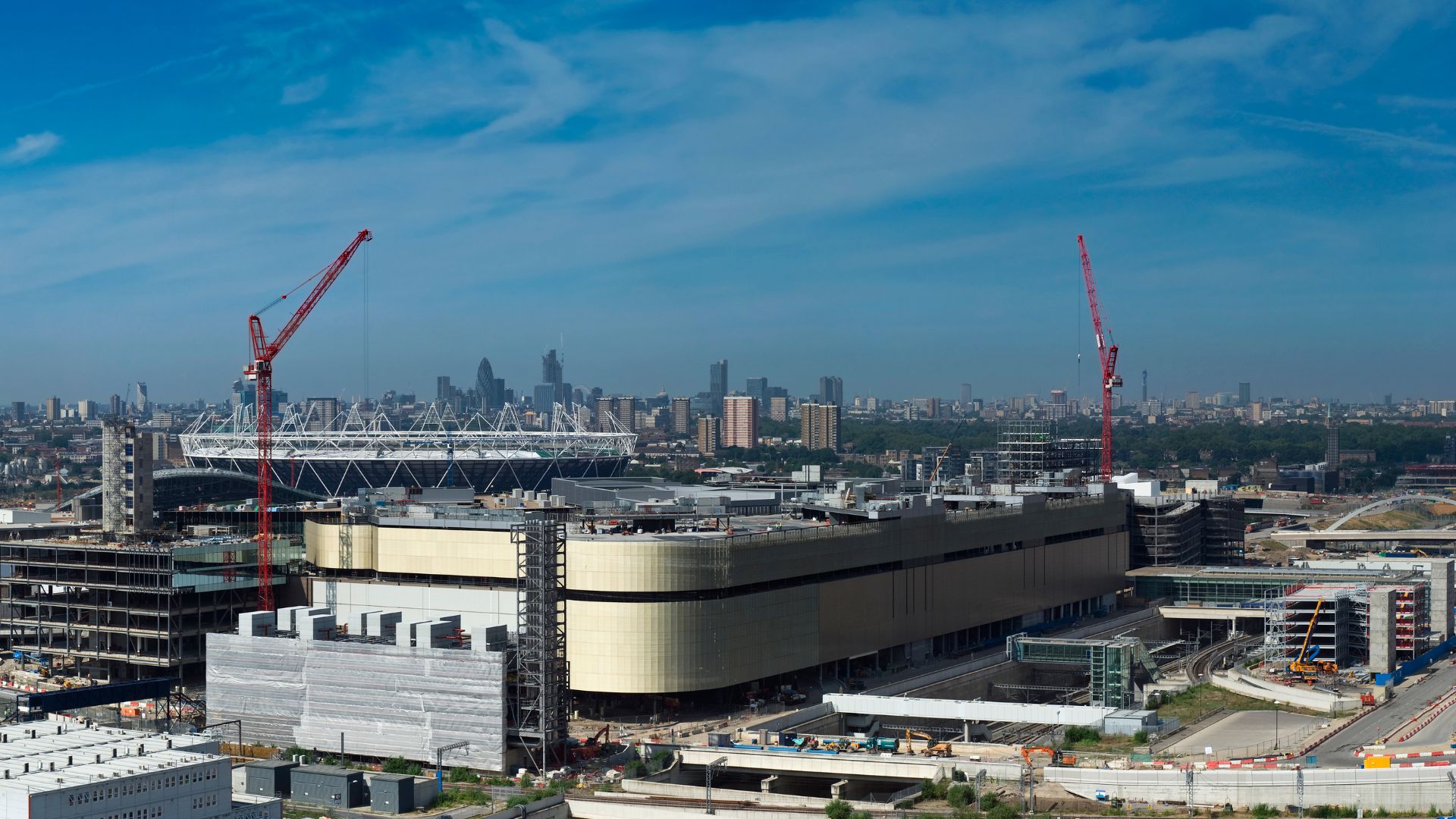2024's Top Urban Regeneration Hotspots
13 Jun, 20241-2 minutes
In this blog, you will learn:
- What urban regeneration is.
- The goal of urban regeneration.
- The role local authorities play in urban regeneration.
- The top areas for urban regeneration across the UK.
- Where the latest regeneration jobs are and how to apply for them.
- Discover more about our regeneration recruitment services.
The Office for National Statistics predicts that in 2026, the UK population will exceed 70 million people. But where is everyone going to live and work we hear you ask?
That’s where urban regeneration comes in.
For the past 70 years, urban regeneration has been at the forefront of the UK’s renewal, growth, sustainability, planning and transformation and projects taking place throughout this year are shaping up to be key players in regenerating the UK’s landscape and economy.
In our latest blog, we’re taking a look at the role local authorities play within urban regeneration and 4 hotspots across the UK to look out for!
What is urban regeneration?
Urban regeneration refers to the process and comprehensive approach to improving urban areas that are in decline or underperforming.
Physical, social and economic strategies must be implemented and carried out by Urban Planners, to make improvements to urban areas.
The physical renewal of urban development sites can involve redeveloping derelict or underused buildings and land and improving infrastructure, such as transportation and public spaces.
Social improvements include addressing issues such as crime and poverty or improving access to education, healthcare and community services.
Environmental sustainability revolves around incorporating green spaces into urban regeneration, promoting biodiversity, reducing carbon footprints and implementing sustainable transport options.
The goal of urban regeneration
Amongst revitalising declining urban areas and transforming neglected urban areas into vibrant and sustainable communities, urban regeneration has many goals.
Urban regeneration is not only a major factor in making communal areas look more aesthetically pleasing, it also plays a crucial role in supporting economic growth and creating jobs for people living in the local community.
Regeneration recruitment specialist, Chris Wilkinson, says “Urban regeneration will help a local economy by attracting businesses, investments and creating employment opportunities for people living locally.”
Another major goal of urban regeneration is to improve the living conditions for local residents through enhancing the quality of housing, public services and amenities.
Chris continues, “Urban regeneration should benefit all members of a community and therefore it should focus on social inclusion and address the requirements of diverse communities.”
Urban regeneration must also adhere to its goal of being environmentally sustainable and contributing to long-term resilience.
The role local authorities play in urban regeneration
From strategy development to delivery, local authorities oversee a number of key responsibilities throughout a regeneration project. Their involvement begins with developing the strategic vision and objectives for regeneration, in order to ensure they align with wider national development goals. Alongside this, frameworks must be created to guide the physical, economic and social transformation of urban regeneration.
Local authorities also often secure the funding required to complete regeneration work, whether this be from a central government grant or public-private partnership. They must effectively allocate financial resources, so that a regeneration project remains on budget and successfully funded.
After a local authority has overseen the implementation of a regeneration project, they are required to monitor the progress and outcome of the work, whilst evaluating the impact it has had on the local community and economy.
If required after evaluation, a local authority must make any necessary adjustments to their plans to achieve the desired outcomes of the regeneration project.
The top areas for urban regeneration across the UK
Understanding where the best regeneration projects are taking place and which locations are undergoing regeneration is essential for investors.
Whether regeneration involves the creation of shopping facilities or a public park, redevelopments play an important part in the local property market and demand to live and work in the area.
As well as increasing the demand for property, urban regeneration also has a positive impact on employment within the area, not just through the jobs that new facilities create, but also through the requirement for highly-skilled workers to complete regeneration projects.
With this said, there are 4 areas across the UK leading the way with urban regeneration and the benefits it’s bringing to their local community.
Where are some of the top areas for urban regeneration?
Some of the top areas for urban regeneration are:
- Leeds
- Birmingham
- London
- Manchester
Leeds
With a population of over 535,000, Leeds is a northern powerhouse when it comes to urban regeneration.
A significant player in this is the Leeds Integrated Station Masterplan, developed by Leeds City Council alongside other partners. With over 100,000 passengers a day, Leeds Station is the busiest transit hub within the north of England and in January 2022, a £161m upgrade was completed. Developments involved the lengthening of platforms and construction of a new concourse, in order to accommodate for the increasing number of commuters.
The Leeds Station is in fact still undergoing a multi-million pound regeneration project in order to cater for a further forecasted increase in passengers. Being remodelled based on an ‘open station’ concept, the development includes new platforms, a new roof and external landscaping amongst other important changes.
The aim of the station's regeneration is to accommodate twice the current number of commuters across the next 30 years and to improve journey times. It will also provide commuters with interactive journey planning and faster travel updates by implementing a smarter ticketing system.
The project will play an important role in creating 35,000 new jobs and 8,000 new homes and construction is expected to be completed by 2033.
Birmingham
A master plan spanning 20 years, Birmingham City Councils Big City Plan, is said to be the most ambitious development project ever launched in the UK.
With its City Centre Masterplan launched in September 2010, this part of the Big City Plan set out how Birmingham city centre would be developed and improved across the next 20 years.
Covering all areas of the built environment, the Big City Plan is expected to contribute over £2 billion to the economy every year, create over 50,000 new jobs, create 65,000 square metres of public spaces and provide over 5,000 new homes.
Like with many current regeneration projects, the Big City Plan will play an important part in addressing the effects of climate change and incorporating sustainable development.
London
For over 10 years, the London government has invested £150 million into maintaining and improving high streets. Working in partnership with local authorities, traders and organisations, the investment now benefits over 100 high streets in London.
Another major ongoing regeneration project within London is The London Plan 2021. Setting out how the city will grow over the next 20-25 years, the plan is a Spatial Development Strategy for Greater London and part of a statutory development plan for London. This means any policies within the plan should be used to make informed decisions on planning applications across the city.
A borough's local plans must also generally conform to the London Plan in order to ensure that the city’s planning system is operated cohesively and reflects the overall strategy for sustainable development!
Manchester
Located in the North of England, Manchester is the third most highly populated city in England, with a population of around 2.7 million people. Like any large city, urban regeneration is crucial in Manchester in order to ensure the city is meeting the demands of a diverse and ever growing population.
Environmentally friendly projects are at the forefront of regeneration within the city and since 2018, the Mayfield Regeneration project, led by integrated consulting engineers and advisors, Buro Happold, has led the way.
The 24-acre site is being built around the city’s first new public park for over 100 years on the banks of the River Medlock and is set to create 1,500 homes, over 154,000m squared of office accommodation and 10,000 jobs. As well as residential buildings, the project will also provide the local community with a wealth of new restaurants, entertainment venues, bars and independent stores.
Whilst not being led by a local authority, the project has a commitment to developing infrastructure that will see natural spaces form integral parts of all neighbourhoods across the city. The Mayfield Regeneration project is part of a wider master plan being implemented across the next 10 years to reconnect Manchester’s citizens to the natural world.
Regeneration jobs
If you’re searching for your next interim regeneration job, why not take a look at the latest vacancies, or simply upload your CV to be notified when a relevant position becomes available.
Regeneration recruitment services
As regeneration recruitment specialists, we support local authorities and private sector businesses nationwide with their temporary, interim and permanent recruitment needs.
If you’re struggling to fill a vacancy, why not get in touch with our regeneration specialist, Chris Wilkinson on 01772 954200 to see how we can help?
Who is Spencer Clarke Group?
Established in 2017, we’re a vibrant and progressive recruitment agency based in the heart of the North West.
We continually reimagine the recruitment process to challenge convention and defy expectations; from creating a better recruitment experience to remodelling employee engagement, we thrive off doing things differently and turning heads along the way.
We operate in two sectors:
In eleven specialisms:
Healthcare, Social Care & Nursing
Corporate Functions & Business Support
Planning, Development & Regeneration
Highways, Infrastructure & Engineering




